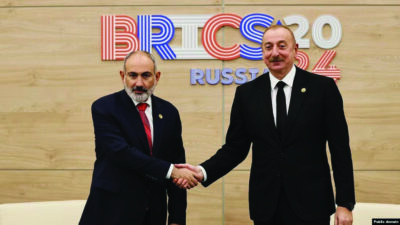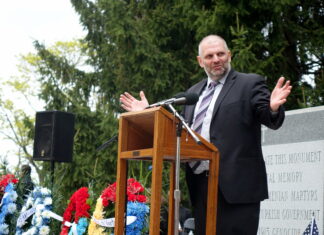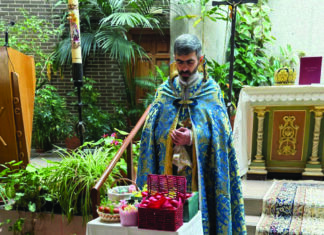WORCESTER, Mass. — After the 1915 Armenian Genocide, Krikor Guerguerian, a priest and genocide survivor, traveled the world collecting evidence to document the atrocities. Taner Akçam, the Robert Aram and Marianne Kaloosdian and Stephen and Marian Mugar Professor in Armenian Genocide Studies at Clark University’s Strassler Center for Holocaust and Genocide Studies, recently collaborated with Turkish experts and graduate students on a digital repository that makes Guerguerian’s vast collection of incriminating documents available to scholars worldwide.
The newly launched Krikor Guerguerian Archive (https://wordpress.clarku.edu/guerguerianarchive/) comprises thousands of original Ottoman documents and Guerguerian’s extensive, unpublished writings. It includes the long-missing handwritten memoirs of Naim Bey, an Ottoman bureaucrat stationed in Aleppo who actively participated in the deportation and massacres of Armenians; documents from the Jerusalem Armenian Patriarchate containing first-hand information about the Armenian genocide; and critical papers from the Istanbul perpetrator trials held from 1919 to 1922 that were long assumed vanished.
Among the most noteworthy materials are ciphered telegrams that the Ottoman Interior Minister Talat Pasha, army commanders, and the chief of the government’s paramilitary sent to governors throughout the Empire. Some of these telegrams, written on government letterhead stamped with the official Ottoman seal, clearly outline the Ottoman government’s planning and execution of the genocide. These “killing orders,” considered the “smoking gun” of the Armenian Genocide, formed the basis of Akcam’s groundbreaking book Killing Orders: Talat Pasha’s Telegrams and the Armenian Genocide, released earlier this year.
Akçam was granted access to the unpublished collection in 2015 by Dr. Edmund Guerguerian, nephew of Fr. Guerguerian, and he has worked diligently to ensure that other scholars of the Armenian Genocide have access to these important documents. He engaged his doctoral candidates Ani Ohanian, Anna Aleksanyan and Burçin Gerçek, and former students Ümit Kurt, PhD ’16 and Emre Can Daglıoglu in an effort to create and launch the digital archive. The group collaborated with others in Paris and Istanbul to translate materials into English.
“Access to these materials has the potential to change scholarly and political discourse as well as to destroy Turkish denial,” wrote Akçam. “It is my duty to make this evidence accessible for the world to see.”
Professor Akçam, whom the New York Times referred to as “The Sherlock Holmes of the Armenian Genocide,” was one of the first Turkish intellectuals to acknowledge and openly discuss the Armenian Genocide. His book The Young Turks’ Crime Against Humanity: The Armenian Genocide and Ethnic Cleansing in the Ottoman Empire, was co-winner of the Middle East Studies Association’s Albert Hourani Book Award and one of ForeignAffairs.com’s “Best Books on the Middle East.”










